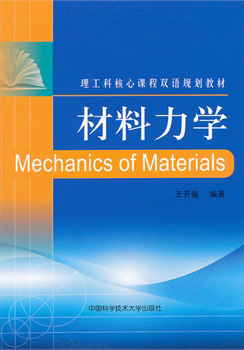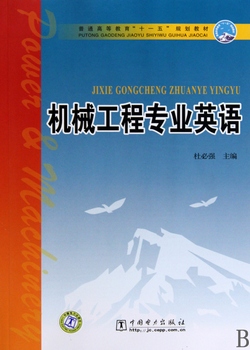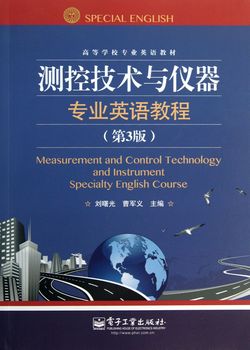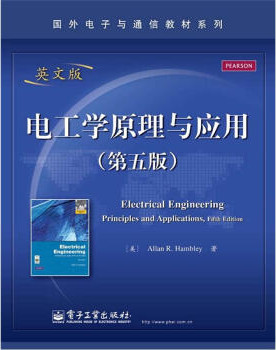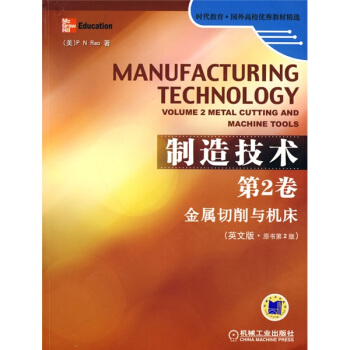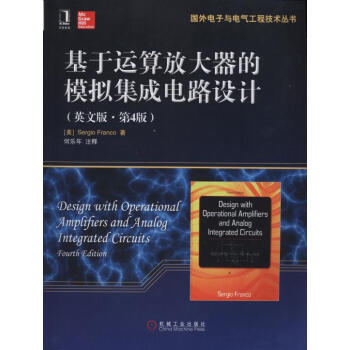制造工程与技术(第4版)(英文改编)
作者: Serope Kalpakjian等原著;唐一平改编
出版时间:2005-03
出版社:高等教育出版社
- 高等教育出版社
- 9787040161014
- 4版
- 138763
- 45241677-9
- 平装
- 异16开
- 2005-03
- 500
- 300
- 工学
- 机械工程
- TH16
- 机械类
- 本科
本书是在SeropeKalpakjian等主编的Manufacturing Engineering and Technology(Forth Edition)教材的基础上改编而成的,改编后的教材既保留了国外原版教材的风格,又适合国内教学的需要,是优秀的“双语”教学教材。
本书除绪论外共三篇20章,第一篇为工程材料基础,主要介绍的金属材料、非金属材料、复合材料的特性、选用方法及在工程中的实际应用,并对纳米材料及高分子材料做了介绍。第二篇为材料成形技术,本篇不仅介绍了传统的铸锻工艺、精密锻造以及粉末冶金、塑料和复合材料的成形技术,还介绍了快速原型和快速模具技术;第三篇为机械加工技术,除了对传统的各种机加工工艺进行了介绍外,还介绍了高速切消加工、现代加工中心、先进刀具和磨削材料、非传统加工技术(化学、电火花、超声、等离子、激光加工等)以及正在逐渐成为现代制造领域的一个重要发展方向的纳米制造和微细加工等先进制造技术。
为了便于读者阅读,本教材在每一章后面都附有中文注释和主要的专业术语,而且在书末还附有按字母顺序排列的中英文对照词汇表。
本书可作为机械设计制造及其自动化专业以及机电类其他相关专业的本科生或研究生的英文教材,也可供相关的工程技术人员参考。
General Introduction
at Is Manufacturing?
e Design Process and Concurrent Engineering
lecting Materials
lecting Manufacturing Processes
puter-Integrated Manufacturing
obal Competitiveness and Manufacturing Costs
an Production and Agile Manufacturing
vironmentally Conscious Design and Manufacturing
PARTⅠ Fundamentals of Materials : Their Behavior and Manufacturing Properties
1 The Structure of Metals
1.1 Introduction
1.2 The Crystal Structure of Metals
1.3 Cold-, Warm-, and Hot-Working
1.4 Work Hardening(Strain Hardening)
1.5 Plastic Deformation of Polycrystalline Metals
2 Mechanical Behavior , Testing, and Manufacturing Properties of Materials
2.1 Introduction
2.2 Tension
2.3 Compression
2.4 Torsion
2.5 Bending(Flexure)
2.6 Hardness
3 Physical Properties of Materials
3.1 Introduction
3.2 Density
3.3 Melting Point
3.4 Specific Heat
3.5 Thermal Conductivity
3.6 Thermal Expansion
3.7 Electrical, Magnetic, and Optical Properties
3.8 Corrosion Resistance
4 Metal Alloys Structure and Cast Irons
4.1 Introduction
4.2 Structure of Alloys
4.3 The Iron-Carbon System
4.4 Cast Irons
5 Ferrous Metals and Alloys
5.1 Introduction
5.2 Production of Iron and Steel
5.3 Carbon and Alloy Steels
5.4 Tool and Die Steels
6 Nonferrous Metals and Alloys
6.1 Introduction
6.2 Aluminum and Aluminum Alloys
6.3 Magnesium and Magnesium Alloys
6.4 Copper and Copper Alloys
6.5 Superalloys
6.6 Titanium and Titanium Alloys
6.7 Low-Melting Alloys
6.8 Precious Metals
6.9 Shape-Memory Alloys
6.10 Amorphous Alloys(Metallic Glasses)
6.11 Nanomaterials
7 Polymers: Structure, General Properties , and Applications
7.1 Introduction
7.2 The Structure of Polymers
7.3 Thermoplastics
7.4 Thermosetting Plastics
7.5 Additives In Plastics
7.6 General Properties and Applications of Thermoplastics
7.7 General Properties and Applications of Thermosetting Plastics
7.8 Biodegradable Plastics
7.9 Elastomers(Rubbers)
8 Composite Materials : Structure, General Properties , and Applications
8.1 Introduction
8.2 The Structure of Reinforced Plastics
8.3 Properties of Reinforced Plastics
8.4 Applications of Reinforced Plastics
8.5 Metal-Matrix Composites(MMC)
8.6 Ceramic-Matrix Composites(CMC)
8.7 Other Composites
PART Ⅱ Forming and Shaping Processes and Equipment
9 Fundamentals of Metal -Casting
9.1 Introduction
9.2 Solidification of Metals
9.3 Metal-Casting Processes
10 Forging of Metals
10.1 Introduction
10.2 Open-Die Forging
10.3 Impression-Die and Closen-Die Forging
10.4 Extrusion and Drawing
11 Processing of Powder Metallurgy
11.1 Introduction
11.2 Production of Metal Powders
11.3 Compaction of Metal Powders
11.4 Sintering
11.5 Process Capabilities
11.6 Economics of Powder Metallurgy
12 Forming and Shaping Plastics and Composite Materials
12.1 Introduction
12.2 Injection Molding
12.3 Blow Molding
13 Rapid -Prototyping Operations
13.1 Introduction
13.2 Additive Processes
13.3 Applications of Rapid-Prototyping Technology
PART Ⅲ Material -Removal Processes and Machines
14 Fundamentals of Cutting
14.1 Introduction
14.2 The Mechanics of Chip Formation
14.3 The Types of Chips Produced In Metal-Cutting
14.4 Cutting Forces and Power
14.5 Tool Life: Wear and Failure
14.6 Surface Finish and Surface Integrity
14.7 Machinability
15 Cutting-Tool Materials and Cutting Fluids
15.1 Introduction
15.2 Carbon and Medium-Alloy Steels
15.3 High-Speed Steels
15.4 Cast-Cobalt Alloys
15.5 Carbides
15.6 Coated Tools
15.7 Alumina-Based Ceramics
15.8 Cubic Boron Nitride
15.9 Silicon-Nitride Based Ceramics
15.10 Diamond
15.11 Whisker-Reinforced and Nanocrystalline Tool Materials
16 Machining Processes Used to Produce Round Shapes
16.1 Introduction
16.2 Turning Parameters
16.3 Lathes and Lathe Operations
16.4 High-Speed Machining, Ultraprecision Machining, and Hard Turning
16.5 Boring and Boring Machines
16.6 Drilling and Drills
17 Machining Processes Used to Produce Various Shapes
17.1 Introduction
17.2 Milling Operations
17.3 Milling Machines
17.4 Planing and Shaping
18 Machining and Turning Centers
18.1 Introduction
18.2 Machining and Turning Centers
18.3 Machining Economics
19 Abrasive Machining and Finishing Operations
19.1 Introduction
19.2 Abrasives
19.3 Bonded Abrasives(Grinding Wheels)
19.4 Honing
19.5 Lapping
19.6 Polishing
19.7 Electropolishing
19.8 Polishing Processes Using Magnetic Fields
19.9 Buffing
20 Advanced Machining Processes and Nanofabrication
20.1 Introduction
20.2 Chemical Machining
20.3 Electrical-Discharge Machining
20.4 Wire EDM
20.5 Laser-Beam Machining
20.6 Electron-Beam Machining and Plasma-Arc Cutting
20.7 Nanofabrication
20.8 Micromachining
20.9 Economics of Advanced Machining Processes
中英文对照词汇表


